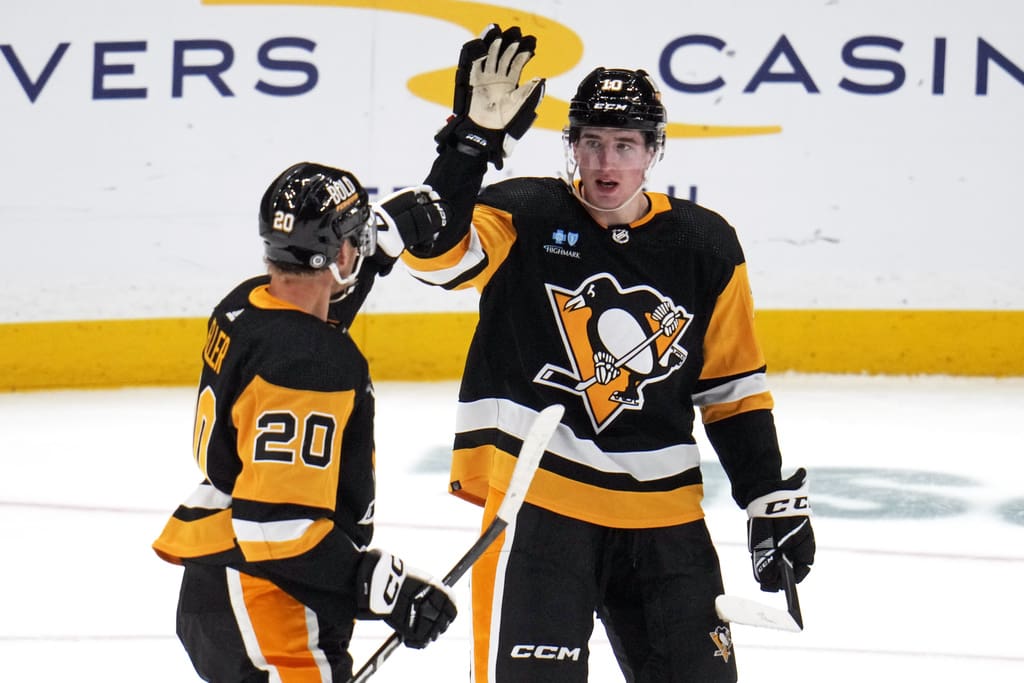Penguins
Penguins Inside: Karlsson’s PP1 Comment, Eller Takes Heavy Role

The Pittsburgh Penguins flashed some of their potential Thursday in a spirited 4-0 whitewash of the Colorado Avalanche. An October Penguins win usually doesn’t get much extra press in these parts, but we’re getting to the point in the Penguins’ life cycle that frustration and gloom were wiping their feet on the welcome mat, ready to enter.
With villagers at the gates, torches and pitchforks in hand, the Penguins showed their highest capabilities.
Evgeni Malkin magically slowed the game to create scoring chances for Reilly Smith and Radim Zohorna. The Penguins backchecked, backchecked, and backchecked more. They disrupted Colorado’s speed game by stopping breakouts before they began.
As coach Mike Sullivan noted, Drew O’Connor backchecked superstar defenseman Cale Makar on one impressive sequence. That’s one way to slow Makar and Nathan MacKinnon.
It was just one game. The Penguins cannot waste the building block by stinking or playing loose against the Ottawa Senators on Saturday, but they at least provided some potential answers to pressing questions.
Mike Sullivan
One of those questions being asked with increasing volume was about coach Mike Sullivan and whether his message was still getting through to a veteran team. The Penguins remain the oldest roster in the NHL, and they only got older with a calendar turn and the additions of Erik Karlsson, Noel Acciari, and Lars Eller.
The disjointed performances in the first six games of the season pushed all of the alarm buttons of last season’s failures: a team unable to dial into its game and worries that the sleigh driver was unable to pull back on the reigns.
From talk shows to fans, the accusations that Sullivan couldn’t or wouldn’t change and the Penguins system was unsustainable for its roster was prevalent. There was some truth to it, but the Penguins’ defensive posture and structure Thursday potentially punctured that narrative.
Just one game but an otherwise solid effort.
The Penguins’ willingness to drop into something close to a 1-2-2 counterattack was a stark departure from the forecheck and only skate-forward ideology that has failed them.
Those worries should be a little cooler today than the day before.
Lars Eller, Leader
The word is out. Eller has a backbone. Past locker room talkers, such as Jason Zucker or Evan Rodrigues, drew the spotlight with colorful language or interesting commentary.
Eller does neither, but he speaks like a leader.
If you’ve read the last two Penguins locker room features, you’ve seen Eller featured because he delivered the unsalted version. It’s direct, it’s simple, but it’s heavy.
Eller has called out the team for not covering its defensive responsibilities and did so with specifics, such as third-forward in the zone staying above the play to cover for active defensemen.
Bryan Rust has become a similar blunt talker, but the Penguins haven’t had a key player in the locker room beyond the core who spoke with accountability and determination like Eller since Matt Cullen.
Eller’s words on Tuesday after the Dallas Stars humbled the Penguins were soft in tone but loud in message.
“I thought we played good enough to win, but we’ve got some holes that we’ve got to shore up, and we’re all aware,” said Eller Tuesday. “We’ve got to go (and) do the work.”
He followed that assessment with, “Other times, it was just fighting in front of the net, and we were on the wrong side too many times today.”
It’s not just what Eller has been saying. It’s also how. There’s a quiet directness. Words delivered by some people just have more weight, even without added emphasis. That’s Eller.
“That’s what we’re capable of,” Eller said with conviction Thursday, and he detailed what they did right.
Power Play?
Erik Karlsson had an interesting take on the Pittsburgh Penguins power play Wednesday morning. I asked him to clarify, but he maintained that someone needed to take charge of the power play.
“We have to maybe have a little bit more urgency on there and take matters into our own hands,” Karlsson said. “Whether it’s me, Geno, Sid, Rusty, or Gentz, you know, we’re all capable of doing that, and we just need to take charge a little bit more, and the rest will follow eventually.”
Every now and then, I’m surprised by comments, or there are little bells that go off in my head when a player identifies a problem without meaning to do so.
I think you have full license to read a dozen different things into Karlsson’s comment. Why hasn’t he taken charge? Why hasn’t associate head coach Todd Reirden put a followable plan in place?
It sounds like the Penguins’ top power-play unit is a rudderless ship with three or four captains and an admiral waiting for someone to steer.
Perhaps getting only one power play helped the Penguins on Thursday. They didn’t waste time or lose momentum. It’s been six weeks since training camp began and four weeks since power play work began. While public heat usually falls on one of the Penguins’ stars, Reirden should be getting a little as well.
From the overwrought movements that created more confusion for the Penguins than the PK to the obstinate perimeter play, PP1 has been largely ineffective.
The Penguins did get a (near) power-play goal Thursday, but it was the second power-play unit that got the puck to the net, creating a broken play and some chaos that ended when Reilly Smith snapped the shot just after the power play expired.












